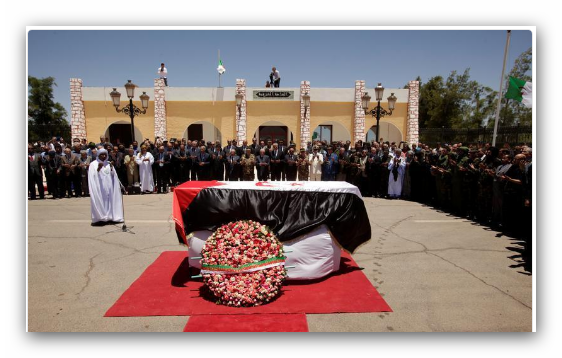RABONI, Algeria (Reuters) - Chanting slogans for
independence, hundreds of Sahrawi people joined diplomats and government
officials in southern Algerian camps to pay their respects to Western Sahara
independence leader Mohamed Abdelaziz who died this week after illness.
Abdelaziz, 68, will be buried on Saturday. On Friday his
coffin arrived in the southern Algerian camps where his Polisario Front
movement has been based since a 1991 ceasefire that halted their conflict with
Morocco for independence.
He died after more than three decades as leader of the
Sahrawi people's Polisario Front movement fighting for self-determination for
the disputed territory, and as president of its self-declared Sahrawi Republic.
Many of those who gathered outside the presidency to greet
his coffin on Friday wore military uniforms of their Polisario forces who
fought a guerrilla war against Morocco until the 1991 ceasefire. Since then the
dispute has been at a stalemate over how to hold a referendum on its future.
An honour guard carried his coffin, and women wept along the
roadside leading to the presidency in an area between the Algerian town of
Tindouf and the Moroccan protective berm that the Polisario calls
"liberated territory".
Attempts to end the Western Sahara conflict have been
blocked over how to carry out the vote, first proposed after the U.N. ceasefire
deal. Polisario has pushed for the referendum, but Morocco is offering an
autonomy plan it says satisfies the U.N. resolution for a "mutually acceptable"
solution.
Morocco took over most of the territory in 1975 after the
end of Spanish colonial rule. That sparked a guerrilla war with the Sahrawis
who say the territory belongs to them. Polisario has been based in southern
Algerian refugee camps since then.
Polisario Front declared 40 days of mourning for Abdelaziz
after which they will hold an extraordinary session to chose a new leader, who
must keep the referendum proposal in the spotlight while managing frustrations
of younger generation of Sahrawi who have spent their lives in refugee camps.
"We have lost a big figure," said Aicha Kebbi, one
of those paying tribute. "But we have other individuals able to take over
and enable us to follow the path of independence."

No comments:
Post a Comment